Brent Marchant's Blog, page 93
May 12, 2018
‘RBG’ offers hope, reason to a world desperately in need of it
“RBG” (2018). Cast: Interviews: Ruth Bader Ginsburg, President Bill Clinton, Senator Orrin Hatch, Nina Totenberg, Gloria Steinem, Ted Olson, Judge Harry Edwards, Lilly Ledbetter, Sharron Frontiero, Stephen Wiesenfeld, Irin Carmon, Shana Knizhnik, Julie Cohen, Betsy West, Jane Ginsburg, James Ginsburg, Clara Spera, Eugene Scalia, Bryant Johnson. Archive Footage: President Jimmy Carter, Antonin Scalia, Martin Ginsburg. Directors: Julie Cohen and Betsy West. Web site. Trailer.
Those on the outside looking in – and seeking the rights freely accorded those on the inside – need advocates to argue their case. Taking on such tasks can indeed be an uphill battle, too. But, with a well-reasoned strategy, patience, and a calm, clear voice, breakthroughs are possible, as many have discovered over the past half century, thanks in large part to the efforts of a remarkable woman, the subject of the new documentary feature, “RBG.”
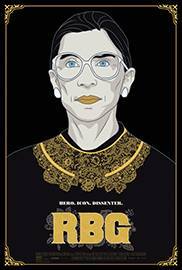
Since 1980, Ruth Bader Ginsburg (“RBG”) has left quite a mark on the U.S. judicial landscape, first in the U.S. Court of Appeals for the District of Columbia Circuit and then in the U.S. Supreme Court. In that time, she has played a pivotal role in joining the majority on a number of key decisions, as well as in penning numerous blistering dissents as part of a vocal minority. But what’s less known is the role that she undertook as a lawyer in the time leading up to her appointments to the bench, a period in which she quietly but significantly reshaped many aspects of everyday life for those seeking equal rights.
Based on the victories of the civil rights movement of the 1960s, RBG employed a similar approach in tackling the women’s rights issues of the 1970s. Having acted as a self-described “kindergarten teacher” to a judicial bench occupied by an all-male, largely white panel of Supreme Court justices, Ginsburg methodically and lucidly drew attention to the inherent discrimination against women in such areas as equal pay and benefits, frequently invoking the Equal Protection Clause of the U.S. Constitution. She used the term “kindergarten teacher” to describe her role in this effort, because she believed that she was providing the justices with a basic education into the existence of institutional (and often legally sanctioned) gender-based discrimination, an issue of which they had little to no awareness. Through measured, carefully delivered arguments in a number of cases, Ginsburg showed the oblivious justices what it meant to be on the short end of the stick.
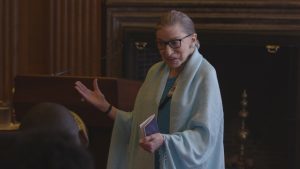
In one of her many public appearances, U.S. Supreme Court Associate Justice Ruth Bader Ginsburg speaks to students about the importance of understanding and upholding the U.S. Constitution, as depicted in the engaging new documentary feature, “RBG.” Photo courtesy of Magnolia Pictures.
What’s more, to avoid being labeled a partisan feminist, RBG employed a fair, balanced approach to fulfilling her objective, not only in terms of the nature of her arguments, but also in terms of the types of cases she took on. In one suit, for instance, she represented a widower who was denied Social Security survivor benefits simply because he was a man, something to which widows were unreservedly entitled to upon the deaths of their husbands. By taking on this case, she demonstrated that fairness is fairness, regardless of gender, a core element of her approach in seeking equal rights for everyone, no matter what their sex.
Ginsburg’s success in these cases came about in large part from the lessons of her upbringing. Having been raised by a mother who taught her not to shout to make her point, RBG employed this strategy in her court arguments. As seen by her five wins in six cases before the Supreme Court, the approach obviously worked.
Ginsburg also believed in achieving results one step at a time – slow, steady progress made incrementally toward the ultimate goal. She learned this from observing the victories in the civil rights movement and believed that the same tactic would work in securing equal rights for women. Based on her track record in legal wins, as well as her subsequent court appointments, it would seem this strategy worked as well, too.

In 1980, lawyer Ruth Bader Ginsburg (right) accepts her appointment to the U.S. Court of Appeals for the District of Columbia Circuit by President Jimmy Carter (left) as seen in the new documentary feature, “RBG.” Photo courtesy of Magnolia Pictures.
If you were to ask Ginsburg what helped her the most, however, she would say that it was the unwavering support she received from her adoring late husband, Martin, depicted in the film through archive footage dating back to their courtship days when they were undergraduates at Cornell University. In excerpts from Ginsburg’s testimony at her 1993 Supreme Court confirmation hearings, she credits her success to Martin, a man quite unusual for his generation in that he recognized her as much for her intellect as he did for her appearance. Throughout her career, he supported her in all of her undertakings, even placing his own work life in a secondary position when necessary to help her advance. For his part, Martin saw the need for gender equality long before many of his peers and continually encouraged RBG to further the cause, doing whatever he could to provide assistance and support.
RBG was fervent about the plight of women in part because she could relate to the burden of responsibility often placed upon them, especially those who sought to be wives and mothers while building careers. She experienced some of this firsthand while in law school; in addition to attending to her own studies, she was the mother of small children and cared for Martin while he battled a rare form of cancer at a time when he was trying to complete his own legal studies. For women to take on such huge responsibilities and receive second-class treatment was patently unacceptable and, she believed, needed to be corrected.
Of course, Ginsburg’s life is not now and never has been all about career and responsibility. As the film shows, she’s an avid opera lover, having even appeared in some performances herself, as well as a strong patron of the arts. She enjoys the company of family, including her children and grandchildren. And, having experienced her own health challenges, she’s also an ardent fan of physical fitness to keep herself strong. Not bad for an 85-year-old who still works tirelessly at her job.
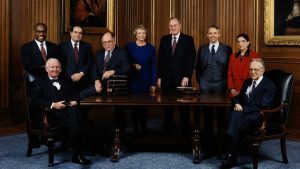
In 1993, Ruth Bader Ginsburg (second row, far right) joins the U.S. Supreme Court as its newest member, as chronicled in the new documentary feature, “RBG.” Photo courtesy of Magnolia Pictures.
What’s more, RBG has demonstrated that it’s possible to rise above the great polarization affecting the country these days. This is illustrated through archival footage depicting her profound friendship with the late Justice Antonin Scalia. While Ginsburg and Scalia were known for being ideologically miles apart, she also made it clear that such philosophical differences needn’t be a barrier to forging a friendship, as was very much the case with this seemingly mismatched odd couple. That, as much as anything, is a lesson many of us could stand to learn from these days.
These lessons and her accomplishments, however, would not have been possible were it not for the strength of her beliefs, the building blocks of the conscious creation process, the means by which we manifest the reality we experience. It’s hard to say if RBG has ever heard of this philosophy, but, based on her achievements, it’s nevertheless apparent that she’s an expert at making use of it, be it unwittingly or purposely.
The power of Ginsburg’s convictions and the depth of the faith she places in them permeate her accomplishments. Their presence is certainly undeniable. And it’s remarkable to think that they all became realized after having started out as mere ideas, intangible conceptions that existed as mere potentials awaiting activation into tangible constructs, something that couldn’t happen until someone came along to infuse the energy into them needed to bring them to life. Those who have benefitted from the realization of these initiatives should be thankful for her efforts.
In large part, Ginsburg’s accomplishments came about largely from her ability to envision change, to think outside the box and seek the implementation of the means to bring these new notions into being. This is a fundamental aim of conscious creation, to continually push the envelope so that reality can evolve and express itself as a constant state of becoming. Considering everything she’s been able to achieve during her time both before and behind the bench, it’s no wonder she’s come to be regarded as the genuine legal and judicial rock star she has become, the Notorious RBG, the title given her in the 2015 best-selling biography about Ginsburg written by Irin Carmon and Shana Knizhnik.

Having survived several health challenges, U.S. Supreme Court Associate Justice Ruth Bader Ginsburg maintains a robust regimen of physical activity, one of her off-bench passions profiled in the new documentary feature, “RBG.” Photo courtesy of Magnolia Pictures.
Despite a slight tendency to gush about its subject, this informative, briskly paced documentary presents an in-depth look at the public and private life of this remarkable woman. Through interviews with Ginsburg, life-long friends, family members, peers, journalists and the politicians who helped shape her career, as well as a variety of archive footage and audio recordings, the film presents a balanced package of information that both enlightens and entertains. For those who are unfamiliar with her many accomplishments, this is must-see viewing.
An old saying maintains that one will catch more flies with honey than with dung. So, in an age where there’s plenty of that substance that so readily sticks to fans freely flying about, it’s comforting to know that there are still reasoned voices out there that can make their points known and build consensus without resorting to unbridled anger or becoming the embodiment of overblown bluster. RBG is one such person, and, no matter how much one agrees or disagrees with her ideologically, we’re all better off for having her in our presence. Her brand of calming, informed argument – even in dissent – is something we need more of if we hope to avoid slipping further into social and judicial chaos. But, even more than that, she presents us with viewpoints that get us to reconsider our perspectives and expand the scope of our sense of inclusiveness in society. And we can probably never have enough of that.
Copyright © 2018, by Brent Marchant. All rights reserved.
The post ‘RBG’ offers hope, reason to a world desperately in need of it appeared first on Brent Marchant.
May 9, 2018
This Week in Movies with Meaning
Reviews of “RBG,” “Crown Heights” and “Grace Jones: Bloodlight and Bami” are all in the latest Movies with Meaning post on the web site of The Good Media Network, available by clicking here.

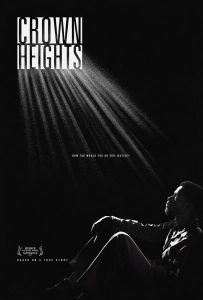
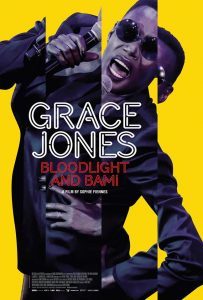

The post This Week in Movies with Meaning appeared first on Brent Marchant.
May 8, 2018
‘Crown Heights’ seeks justice in its absence
“Crown Heights” (2017). Cast: Lakeith Stanfield, Nnamdi Asomugha, Natalie Paul, Bill Camp, Luke Forbes, Adriane Lenox, Zach Grenier, Josh Pais, Skylan Brooks, Nestor Carbonell, Armand Schultz. Director: Matt Ruskin. Screenplay: Matt Ruskin. Web site. Trailer.
Seeking justice is sometimes an unbelievably slow and difficult process. Bureaucratic procedures, sloppy investigative work and officials unwilling to admit making mistakes all contribute to needlessly complicating matters. The frustration can be exasperating for everyone involved, especially those who have been wrongfully convicted. Such is the case in the fact-based biographical drama “Crown Heights,” now available on DVD and video on demand.

In 1980, 18-year-old Colin Warner (Lakeith Stanfield) was arrested, convicted and incarcerated for a murder he did not commit in the Crown Heights neighborhood of Brooklyn, New York. The young immigrant from Trinidad was not on the scene of the crime, nor did he know the victim. And the evidence used to convict him largely came from the coerced testimony of unreliable juvenile witnesses who essentially said anything to stop the relentless intimidating interrogation they were subjected to by NYPD detectives.
To make matters worse, when put on trial, Warner and co-defendant Anthony Gibson (Luke Forbes) were not represented by adequate legal counsel. And, when sentenced, they received different prison terms. Because he was a juvenile at the time of the shooting, Gibson, the perpetrator who actually pulled the trigger, was sentenced to 9 years to life, while Warner, an adult and who was characterized as a mere accomplice to the crime, earned 15 years to life – all for an offense in which he played no part.
Once behind bars, Warner had trouble adjusting to his surroundings, frequently having run-ins with brutal, harassing guards. One such encounter even landed him in solitary confinement for two years. It seemed like he would never escape his circumstances. That was not for a want of trying, though; appeals were launched on his behalf, but they were dismissed or bungled by inept, ill-prepared attorneys.
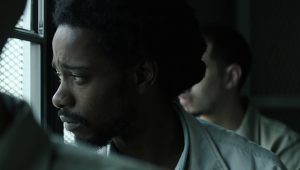
Wrongly convicted inmate Colin Warner (Lakeith Stanfield) spends more than 20 years behind bars while awaiting justice in the gripping biographical drama, “Crown Heights,” now available on DVD and video on demand. Photo courtesy of IFC Films.
The pain of Warner’s circumstances weighed heavily not only on him, but also on those who cared about him, most notably his childhood friend, Carl “KC” King (Nnamdi Asomugha), and his onetime romantic interest, Antoinette (Natalie Paul). They organized fundraisers for Colin’s appeals and pursued every available channel to seek his freedom. Carl even went so far as to place his own family’s financial future in jeopardy to help out his friend, firmly convinced in his innocence and the need to be released from prison.
After more than 20 years behind bars, Warner finally caught a break. Thanks to his undying diligence, Carl secured the services of a new attorney, William Robedee (Bill Camp), who could clearly see the errors made in Colin’s prosecution, defense and previous appeals. He believed he could successfully make a case to get Warner out of jail and his conviction overturned. At last, it seemed, justice would finally be done.
“Crown Heights” effectively illustrates how the truth will out, no matter how long it takes and how difficult the process may be. Justice can be done, even when the deck seems heavily stacked against those seeking it. But, thanks to perseverance and the will to succeed, the proof will eventually surface to make such outcomes possible. Indeed, a little bit of conviction can go a long way toward overturning one that’s been wrongfully implemented.
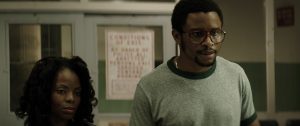
Seeking justice for an innocent man wrongly incarcerated occupies much of the time and attention of the inmate’s best friend, Carl (Nnamdi Asomugha, right), and significant other, Antoinette (Natalie Paul, left), in the fact-based drama, “Crown Heights.” Photo courtesy of IFC Films.
That kind of certainty comes from firmly held beliefs that the desired outcome will emerge, the cornerstone of the conscious creation process, the means by which our reality arises. For Colin and his supporters, the utterly preposterous result that came from his prosecution caused them, at a very deep level, to have no other belief than the fact that it eventually would be overturned and that justice would be served. Even though there were many times when it seemed that such a day would never come, Colin, Carl and Antoinette, among others, never lost sight of what they were seeking – and the beliefs that were driving it.
This is where the power of faith in our beliefs comes to the fore. This is not faith in a traditional religious sense but, rather, an unshakable conviction in the validity and truth of what we’re convinced is an absolute capable of eventual manifestation. Were it not for that kind of faith, one can only imagine how Colin may have fared – and where he might be today.
Of course, those skeptical about the veracity of conscious creation nearly always look at situations like this and wonder, why would anyone seek to materialize such horrendous circumstances in the first place? And, to be sure, that’s an argument that would seem to have some merit. But the answer is not quite so simple.
In all of our conscious creation undertakings, our reasons ultimately are our own (and not really anybody’s business to question). Yet, for better or worse, in many of these endeavors, we often seek to manifest conditions that fulfill our desire to experience certain life lessons, no matter how enjoyable or unpleasant they ultimately may be. For instance, someone wishing to experience the plight of injustice would almost assuredly create circumstances not unlike those displayed here. Manifestations like these truly serve to drive it home with pointed, inescapable fidelity.

After a long wait behind bars, wrongly convicted inmate Colin Warner (Lakeith Stanfield, left) finally gets to reunite with his romantic interest, Antoinette (Natalie Paul, right), in director Matt Ruskin’s “Crown Heights,” now available on DVD and video on demand. Photo courtesy of IFC Films.
That, of course, raises another question – why would anyone want to experience something like the perils of injustice? Again, the specific reasons vary from person to person, but sometimes going through such ordeals helps to draw sufficient attention to them that it prompts its victims to seek ways to prevent it from happening again, either to themselves or to others similarly situated. This kind of “metaphysical activism” can go a long way toward the abolition of such abhorrent circumstances, eventually transforming them into conceptions considered unthinkable.
Colin’s experience is a prime example of this. Having been wrongfully incarcerated for a crime in which he had no involvement, Colin has since gone on to become an advocate to fight for the justice of those who have gone through what he did. Just as erroneously convicted inmate Kenny Waters (Sam Rockwell) and his legal advocate sister Betty Anne (Hilary Swank) discovered in the fact-based drama “Conviction” (2010), the injustice of a false imprisonment is something we as a society cannot tolerate. But sometimes the only way to fully appreciate the indignities of such experiences – and to subsequently seek their correction – is to go through them firsthand to see how dispiriting they are. It’s something not all of us are cut out for, but it’s a sacrifice to be commended – and one for which we should all be grateful.
This overlooked gem from 2017 spent only a short time in theaters, but it’s well worth the viewing time. The heartfelt performances by Stanfield and Asomugha, who earned an Independent Spirit Award nomination for best supporting actor, are truly outstanding, effectively depicting the hope, determination, frustration and heartache that each of them endured. The film also captures the claustrophobic feeling of incarceration, as well as the deplorable, demoralizing conditions of prison life, a true hell for anyone but especially so for the falsely convicted – of whom, the film pointedly notes, there are more than 120,000 such individuals who are mistakenly behind bars in the U.S. today.

The long wait for justice weighs heavily on wrongly incarcerated inmate Colin Warner (Lakeith Stanfield) in the fact-based biographical drama, “Crown Heights.” Photo courtesy of IFC Films.
When justice is elusive, there may be a natural tendency to lash out and seek retribution at almost any cost, an outcome that’s more vengeance than justice. But such rash measures seldom produce the hoped-for results, especially when up against a rigid, slow-moving system. By having faith that the truth will surface and persistently pursuing the means to elevate it from the depths of obscurity, it is possible to secure the prized results – even when they’re seemingly nowhere to be seen.
Copyright © 2018, by Brent Marchant. All rights reserved.
The post ‘Crown Heights’ seeks justice in its absence appeared first on Brent Marchant.
May 2, 2018
‘Lady Macbeth’ cautions us to control our powers of creation
“Lady Macbeth” (2017). Cast: Florence Pugh, Cosmo Jarvis. Paul Hilton, Naomi Ackie, Christopher Fairbank, Golda Rosheuvel, Anton Palmer, Cliff Burnett, Bill Fellows. Director: William Oldroyd. Screenplay: Alice Birch. Novella: Nikolai Leskov, Lady Macbeth of Mtsensk District. Web site. Trailer.
How far are you willing to be pushed before you reach your limits? Some of us might cave in quickly, while others will endure much. A lot ultimately depends on the nature of the circumstances and how willing we are to tolerate them. For one independently minded woman, those limits get reached rather fast, and her recourse is something to which most of us would probably never resort, consequences explored in the chilling gothic tale, “Lady Macbeth,” available on DVD, Blu-ray disc and video on demand.
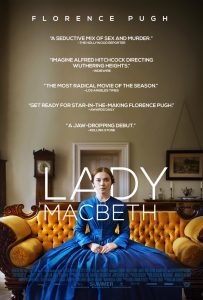
In 1865 rural England, the young, lovely Katherine Lester (Florence Pugh) is “sold” into an arranged marriage. Now betrothed to a cold, unfeeling husband, Alexander (Paul Hilton), thanks to a deal brokered by his father, Boris (Christopher Fairbank), Katherine becomes the lady of the house but primarily in name only. In Alexander’s view, Katherine is more like property or a showpiece than his loving spouse. He issues an array of dictates to keep her line, such as forbidding her to leave the house to go for walks. At the same time, he shows her little attention, be it emotionally, romantically or even sexually. And, to make sure that she keeps in line with his demands, Alexander allows his father and the local vicar (Cliff Burnett) to exert whatever pressure is needed to see that she conforms.
Needless to say, Katherine tires of such treatment quickly. However, given the rigid social strictures of the day, especially when it comes to women “knowing their place,” what is she to do? The opportunity to assert her independence comes when Alexander is called away on business for an extended time. She begins engaging in forbidden activities, like going for walks by herself. But the biggest challenge to her husband’s authority comes when she takes a lover, Sebastian (Cosmo Jarvis), a stable hand who shows her the kind of attention that Alexander won’t. Before long, the two launch into a full-fledged affair, one in which Katherine’s not especially discreet about her behavior – and something about which she’s not overly concerned, even upon Alexander’s unexpected return.
Having had a taste of personal empowerment, Katherine won’t settle for things going back to the way they were. She knows what it means to be in charge of her destiny, and she obviously likes it. But, to maintain such control, she must now resort to more drastic measures, some of which carry potentially serious consequences.
In an age where women have been increasingly claiming their power, this film is quite a timely release. However, the picture also provides a powerful cautionary tale in asking the questions, “How much is too much?” and “How far is too far?” In fact, that provides a valuable hint about the meaning lurking behind the title of this release; while the story has nothing to do directly with Shakespeare, it has everything to do with the character after whom Katherine is patterned.
This is crucial to how Katherine’s reality unfolds. The outcome is a direct result of the power of her beliefs, thoughts and intents, for they shape her existence through the conscious creation process, the means by which it arises and materializes around her. However, while those metaphysical building blocks may give her what she seeks, they may also hold the potential for related fallout that could end up carrying significant and troublesome consequences.
When we create without regard for what may accompany our sought-after goals, we can set ourselves up for extreme difficulties, ranging from personal hardships to legal liabilities to even bad karma. This is known as un-conscious creation or creation by default, where the drive for the fulfillment of our objectives takes unqualified precedence over anything else. It may indeed bring us what we seek, but it might also saddle us with trials and tribulations no one would want.
In large part, this practice arises from a notion known as pushing the Universe. As our divine collaborator in the conscious creation process, the Universe (or God, All That Is or whatever other term best suits you) acts as our manifesting partner, providing the means to bring about outcomes in line with our beliefs. However, when we infuse our intentions with a forceful attitude – one hell-bent on achieving the desired results, no matter what the cost – we may end up unwittingly pushing our collaborator into bringing us outcomes laden with all manner of unwanted baggage. Even if their appearance doesn’t show up immediately, their presence is likely to appear at some point, perhaps when we believe we’re in the clear or when we least expect it.
Katherine obviously disregards these considerations in her approach. At first glance, she seems quite successful in getting what she wants. But will that last? Considering the power she’s wielding, the outcomes she seeks, and the potential consequences associated with her beliefs and actions, one can’t help but wonder how long her luck will last. There’s an important caution in that for any of us who believe we can get away with whatever we want, whenever we want, even if the hoped-for results manage to materialize. We need to tread carefully, lest we end up with more problems than we started with.
With that said, “Lady Macbeth” is a film that’s definitely not for the squeamish. Even though it avoids the trap of gratuitousness, there are aspects of the story that could prove unsettling for more sensitive viewers. However, in delivering this powerful and sometimes chilling tale, director William Oldroyd and a fine ensemble cast led by Florence Pugh serve up a tale full of questionable and conflicted emotions and motivations, all wrapped up in a beautifully filmed period piece package. For its efforts, the picture received two BAFTA Award nominations and an Independent Spirit Award nomination for best international film.
It’s been said that “Hell hath no fury like a woman scorned,” and those on the receiving end of such animosity can attest to the wisdom of that statement. However, knowing when to rein in that scorn is crucial, too, especially for those who want justice without going over the top. “Lady Macbeth” puts both issues in perspective and gives us pause to contemplate the options before there’s no going back.
Copyright © 2018, by Brent Marchant. All rights reserved.
The post ‘Lady Macbeth’ cautions us to control our powers of creation appeared first on Brent Marchant.
Tune in for The Cinema Scribe
Tune in for the latest Cinema Scribe segment on Bring Me 2 Life Radio, Wednesday, May 2, at 12:45 pm ET, available by clicking here. And, if you don’t hear it live, catch it later on demand!


The post Tune in for The Cinema Scribe appeared first on Brent Marchant.
April 25, 2018
Tune in for Movies with Meaning
Join host Frankie Picasso and me for the next edition of Movies with Meaning on The Good Media Network’s Frankiesense & More broadcast, tomorrow, April 26, at 1 pm ET. In this edition rescheduled from last month, we’ll discuss a number of new movie releases and other film-related news. For the live video version, tune in on Facebook by clicking here. And, for the audio only on-demand podcast edition, check out The Good Media Network’s home page by clicking here. Join us for some fun movie chat!

The post Tune in for Movies with Meaning appeared first on Brent Marchant.
April 20, 2018
‘A Quiet Place’ explores the difficulty – and necessity – of adaptation
“A Quiet Place” (2018). Cast: Emily Blunt, John Krasinski, Millicent Simmonds, Noah Jupe, Cade Woodward, Leon Russom. Director: John Krasinski. Screenplay: Bryan Woods, Scott Beck and John Krasinski. Story: Bryan Woods and Scott Beck. Web site. Trailer.
Imagine what it would be like to drastically change how you conduct your life in very fundamental ways. The adjustment could be extremely difficult, especially if you’ve grown accustomed to following certain established practices and procedures. But suppose your life depended on making those now-necessary alterations. Picture that, and you’ve got an idea what a family of everyday folks must do to cope with life in the gripping new science fiction stunner, “A Quiet Place.”
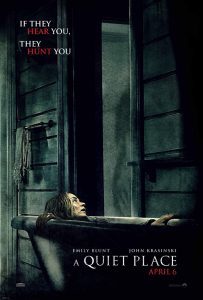
With the arrival of a race of vicious predators, the Earth has become, as the film’s title observes, a very quiet place. That’s because the beastly creatures hunt based on sound, with the slightest noise capturing their attention. Indeed, anything louder than a whisper could suddenly place your life in serious jeopardy. Those wishing to stay alive have had to learn how to keep mum to avoid the prospect of an utterly devastating end.
Those are the conditions under which the Abbott family must now function in order to survive. The farm family struggles to keep quiet, something that proves more difficult than one might initially realize. As humans, we take our actions and their associated sounds for granted. It thus truly becomes challenging to lead lives where we must constantly look for ways to suppress the noise. But, then, that’s essential given what’s at stake.
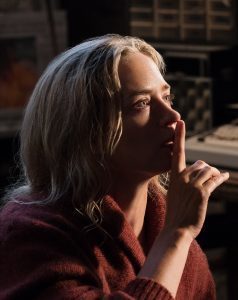
Evelyn Abbott (Emily Blunt), a caring wife and mother, constantly reminds her family to keep mum to stay alive in the chilling new horror film, “A Quiet Place.” Photo courtesy of Paramount Pictures.
The film follows the lives of the family patriarch, Lee (John Krasinski), and his wife, Evelyn (Emily Blunt), in their efforts to protect their children, Regan (Millicent Simmonds), Marcus (Noah Jupe) and Beau (Cade Woodward). No matter how diligent they are, however, tragedy looms at every turn, something that inevitably can’t be avoided. The same is true for its potentially devastating consequences.
Nevertheless, these circumstances force the family to get creative in their self-preservation efforts. Through rather perilous trial and error, the Abbotts come to learn when it’s safe to vocalize their thoughts and when to look for other means of conveying them. Ironically, one “advantage” they have is their knowledge of American Sign Language, the means by which they learned to communicate with Regan, who was deaf before the predators’ arrival. ASL thus becomes the primary means by which the family members communicate with one another, too, something that proves a godsend under such extremely trying conditions.
Still, even with such creative means at the family’s disposal, situations arise that cause trouble. Incidents as simple as the shattering of glass, for example, cause panic to set in, prompting hyper-vigilance to evade the predators and stay alive. And, as the Abbotts’ story plays out, seemingly everyday events that naturally produce sound – and that we take for granted – suddenly become matters of life and death. One can only imagine how things will unfold when a pregnant Evelyn is ready to give birth.

Husband and wife Lee and Evelyn Abbott (John Krasinski, right, Emily Blunt, left) struggle to keep their family alive under unusual and trying circumstances in the gripping new sci-fi release, “A Quiet Place.” Photo courtesy of Paramount Pictures.
Given the nature of this story, which principally focuses on taking viewers on a tour of this new and very different world, the narrative is somewhat episodic in scope, but, in this case, that works because of the common elements that link different segments to one another. Also, because of the small ensemble involved here, the film doesn’t cast an especially wide net with its characters, but, again, that works well to keep the story from becoming cluttered or unfocused.
With that said, though, the picture is by no means simplistic or monodimensional. Themes like overcoming fears, surviving the dark night of the soul and thinking creatively to solve personal dilemmas are effectively addressed with treatments reminiscent of those found in movies like “Signs” (2002). What’s more, the picture’s richly layered narrative is deftly punctuated with spiritual symbolism that carries deeper meanings, a quality rarely, if ever, seen in releases in this genre.
This includes the principles of conscious creation, the philosophy that maintains we manifest the reality we experience through the power of our thoughts, beliefs and intents. The aforementioned concepts of facing fears and overcoming limitations, for example, figure prominently in conscious creation practices, as well as in the film’s narrative. The characters’ actions in these regards provide viewers with an effective showcase for these principles at work.
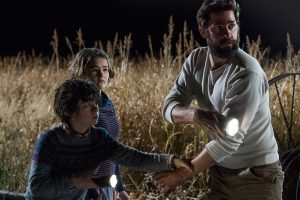
Devoted father Lee Abbott (John Krasinski, right) doggedly protects his children, Marcus (Noah Jupe, left) and Regan (Millicent Simmonds, center), against deadly predators in the new sci-fi offering, “A Quiet Place.” Photo courtesy of Paramount Pictures.
Of course, if conscious creation maintains that we create the existence we experience, one might wonder why the Abbotts have manifested the reality in which they find themselves. Why would anyone intentionally want to materialize such dire circumstances?
That’s a legitimate question, to be sure. And the exact reasons rest with the characters themselves, something with which viewers are not privy. However, in situations like this, we usually manifest such conditions as a means to learn and experience certain life lessons, no matter how pleasant or difficult they may be, because the only way to do so is to immerse ourselves in them to gain firsthand knowledge. We may disagree with the way in which the Abbotts have chosen to pursue such matters, but, then, it’s not up to us to judge them (or anyone else who elects to manifest any kind of comparably difficult circumstances for that matter). Since conscious creation fundamentally makes all options possible, for better or worse, at any given moment in time, the choice for experiencing certain kinds of lessons lies with each of us, and, because of that, those choices, in all fairness, should be free from such undue judgment and scrutiny. Like all of us, the characters here should be allowed to learn these lessons and experience these circumstances for themselves, no matter what we may think. We wouldn’t want others to subject us to such intense examination, and we should be willing to grant the same to them.

Doting mother Evelyn Abbott (Emily Blunt, left) struggles to protect her daughter, Regan (Millicent Simmonds, right), against constant perils in “A Quiet Place.” Photo courtesy of Paramount Pictures.
Writer-actor-director John Krasinski’s atmospheric offering serves up a haunting, suspenseful tale that proves it’s possible to make a chilling horror film without worrying about how high the body count gets. Despite a few minor plot holes, the story is solid, inventive and skillfully executed, making stunning use of elements – like sound and sound editing – that rarely get a chance to play center stage in a film’s finished product. But be cautioned that, if you go see this one, you should also be prepared to have the crap scared out of you.
Those familiar with my viewing habits are well aware that I rarely screen horror films. As I have written on previous occasions, their gore-dripping gimmickry and gratuitous imagery frequently make me wish that I would have skipped the concession stand on my way into the theater. However, when pictures in this genre are intelligently handled and have something meaningful to say, I’m more than happy to sing their praises, and that’s certainly the case here. Take the time to see this one, and, if you like it, be sure to shout about it from the rooftops.
Copyright © 2018, by Brent Marchant. All rights reserved.
The post ‘A Quiet Place’ explores the difficulty – and necessity – of adaptation appeared first on Brent Marchant.
April 17, 2018
Tune in for The Cinema Scribe
Tune in for the latest Cinema Scribe segment on Bring Me 2 Life Radio, tomorrow, April 18, at 12:45 pm ET, available by clicking here. And, if you don’t hear it live, catch it later on demand!


The post Tune in for The Cinema Scribe appeared first on Brent Marchant.
April 16, 2018
This Week in Movies with Meaning
Reviews of “A Quiet Place” and “Lady Macbeth,” as well as a radio show preview, are all in the latest Movies with Meaning post on the web site of The Good Media Network, available by clicking here.



The post This Week in Movies with Meaning appeared first on Brent Marchant.
April 3, 2018
Check out The Cinema Scribe
Tune in for the latest Cinema Scribe segment on Bring Me 2 Life Radio, tomorrow, April 4, at 12:45 pm ET, by clicking here. And, if you don’t hear it live, catch it later on demand!


The post Check out The Cinema Scribe appeared first on Brent Marchant.



